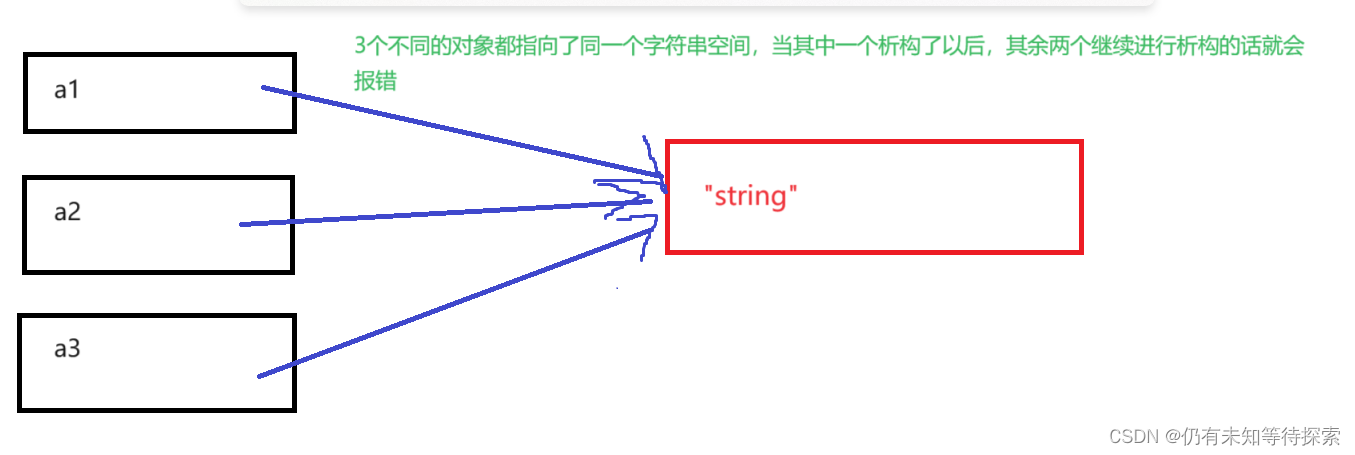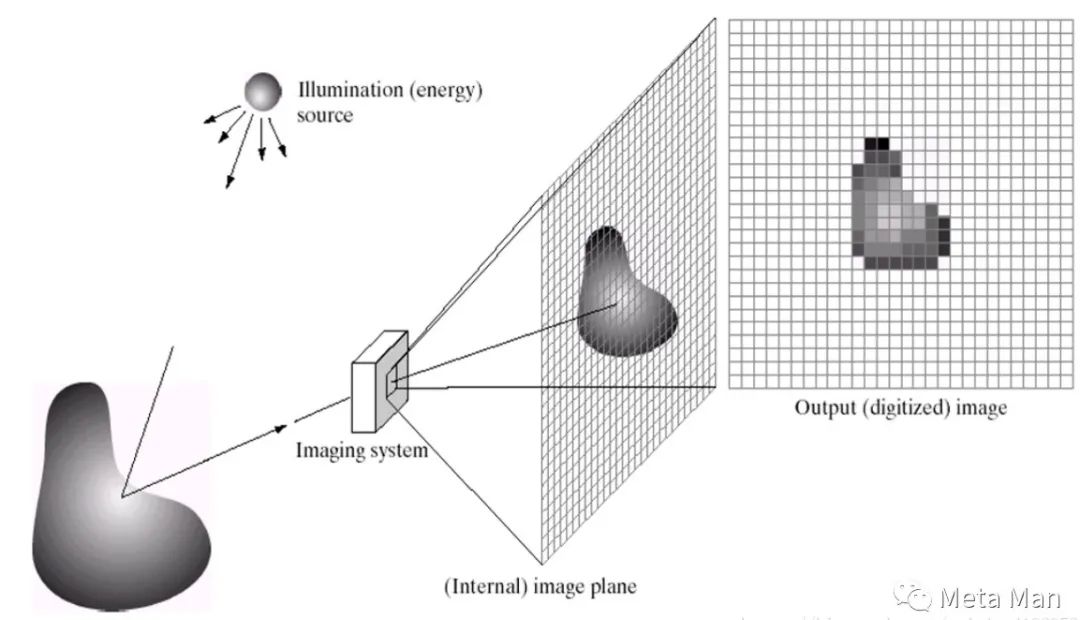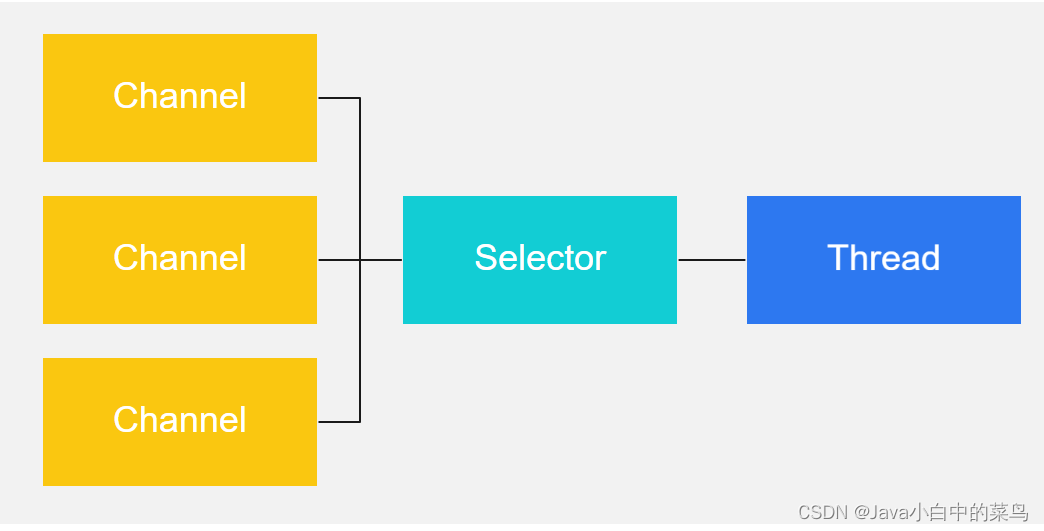个人主页:仍有未知等待探索-CSDN博客
专题分栏:C++
请多多指教!
目录
一、标准库中的string
1、了解
2、string类常用接口说明
1、常见的构造函数
2、容量操作 编辑
3、访问及遍历操作
4、修改操作
5、非成员函数
二、string类实现
1、string类的大体框架
2、构造和析构函数
3、迭代器
4、成员函数
5、非成员函数
三、问题
1、深拷贝和浅拷贝问题
2、strcpy,memcpy
四、总代码
一、标准库中的string
1、了解
1、string是表示字符串的字符串类
2、该类的接口与常规容器的接口基本相同,再添加了一些专门用来操作string的常规操作。
2、string类常用接口说明
下面的函数都可以去下面的网址进行查文档,来看函数的功能。(接下来我会实现这个string类)
string - C++ Reference
1、常见的构造函数
| 函数名称 | 功能说明 |
| string() | 构造空的string类,即空字符串 |
| string(const char*s) | 用c_str()来构造string类对象 |
| string(size_t n, char c) | string类对象中包含n个字符c |
| string(const string& s) | 拷贝构造函数 |
2、容量操作

3、访问及遍历操作

4、修改操作

5、非成员函数

二、string类实现
实现string类能让我们更好的明白模板的使用,函数重载等等。
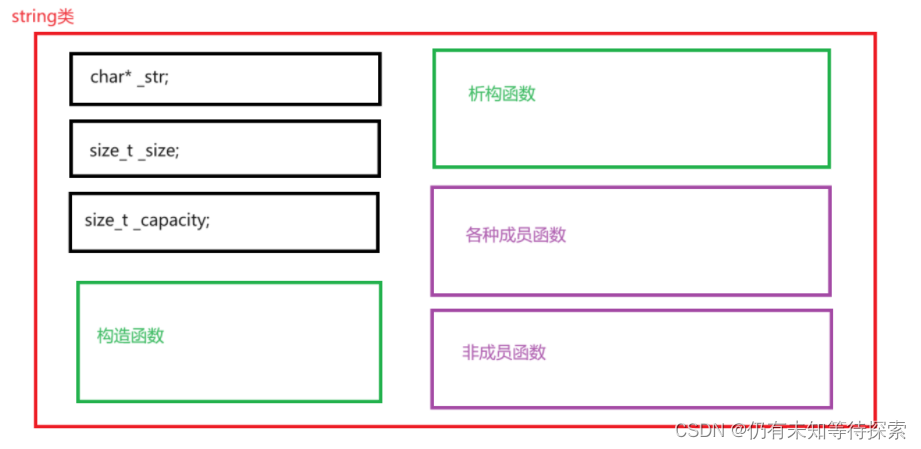
1、string类的大体框架
#include <iostream>
#include <cstring>
#include <assert.h>
using namespace std;class string
{
public:private:char* _str; // string存的字符串size_t _size; // string中字符串的长度 size_t _capacity; // string的容量
};2、构造和析构函数
string():_str(nullptr),_size(0),_capacity(0)
{}
string(const char* str):_size(strlen(str)),_capacity(_size)
{_str = new char[_capacity + 1];strcpy(_str, str);
}
string(const string& str):_str(new char[str._capacity + 1]),_size(str._size),_capacity(str._capacity)
{strcpy(_str, str._str);
}
~string()
{delete[] _str;_str = nullptr;_size = 0;_capacity = 0;
}3、迭代器
typedef char* iterator;
iterator begin()
{return _str;
}
iterator end()
{return _str + _size;
}
4、成员函数
string& operator=(const string& str)
{char* tmp = new char[str._capacity + 1];strcpy(tmp, str._str);delete[] _str;_str = tmp;_size = str._size;_capacity = str._capacity;return *this;
}
void reserve(int x)
{if (_capacity < x){char* tmp = new char[x + 1];strcpy(tmp, _str);delete[] _str;_str = tmp;_capacity = x;}
}
void swap(string& str)
{std::swap(_str, str._str);std::swap(_size, str._size);std::swap(_capacity, str._capacity);
}
const char* c_str() const
{return _str;
}
void clear()
{_str[0] = '\0';_size = 0;
}
void insert(int index, const string& str)
{int len = str._size;assert(index >= 0 && index < _size);if (_size + len >= _capacity){reserve(_capacity + len);}for (int i = _size - 1; i >= index; i -- ){_str[i + len] = _str[i];}for (int j = 0, i = index; j < str._size; j ++ ,i ++ ){_str[i] = str._str[j];}_size += len;
}
void insert(int index, char ch)
{assert(index >= 0 && index < _size);if (_size + 1 >= _capacity){reserve(2 * _capacity);_capacity *= 2;}for (int i = _size - 1; i >= index; i -- ){_str[i + 1] = _str[i];}_str[index] = ch;_size ++ ;}
void append(const string& str)
{int len = str._size;if (len + _size > _capacity){reserve(len + _size);_capacity = len * _size;}int end = _size;for (int i = 0; i < str._size; i ++ ,end ++ ){_str[end] = str._str[i];}_size += len;
}
string& operator+=(const string& str)
{append(str);return *this;
}
void push_back(const char ch)
{if (_size + 1 >= _capacity){reserve(2 * _capacity);}_capacity *= 2;_str[_size] = ch;_size ++ ;
}
int size() const
{return _size;
}
int capacity() const
{return _capacity;
}
bool empty() const
{return _size == 0;
}
void resize(int n, char ch = '\0')
{if (n < _size){for (int i = n; i < _size; i ++ ){_str[i] = '\0';}}else if (n + 1 < _capacity){for (int i = _size; i < n; i ++ ){_str[i] = ch;}}else{reserve(n);}
}
char& operator[](size_t index)
{assert(index < _size);return _str[index];
}
const char& operator[](size_t index)const
{assert(index < _size);return _str[index];
}
bool operator==(const string& str)
{int ret = strcmp(_str, str.c_str());return ret == 0;
}
bool operator!=(const string& str)
{return !(*this == str);
}
bool operator>(const string& str)
{int ret = strcmp(_str, str.c_str());return ret > 0;
}
bool operator<(const string& str)
{int ret = strcmp(_str, str.c_str());return ret < 0;
}
bool operator<=(const string& str)
{return *this < str || *this == str;
}
bool operator>=(const string& str)
{return *this > str || *this == str;
}
int find (char c, size_t pos = 0) const
{assert(pos < _size);for (int i = pos; i < _size; i ++ ){if (_str[i] == c) return i;}return npos;
}
int find (const char* s, size_t pos = 0) const
{char* p = strstr(_str + pos, s);if (p != nullptr){return p - _str;}return npos;
}
string& erase (size_t pos = 0, size_t len = npos)
{assert(pos < _size);if (len == npos || len >= _size - pos){_str[pos] = '\0';_size = pos;}else{int i = 0;for (i = pos + len; i < _size; i ++ ){_str[i - len] = _str[i];}_str[i] = '\0';_size -= len;}return *this;
}5、非成员函数
ostream& operator<<(ostream& out, const string& str){int len = str._size;for (int i = 0; i < len; i ++ ){out << str._str[i];}return out;}istream& operator>>(istream& in, string& str){str.clear();char ch = in.get();char buff[128];int i = 0;while (ch != ' ' && ch != '\n'){buff[i ++ ] = ch;if (i == 127){buff[i] = '\0';str += buff;i = 0;}ch = in.get();}if (i != 0){buff[i] = '\0';str += buff;}return in;}
}三、问题
1、深拷贝和浅拷贝问题
浅拷贝:也称位拷贝,编译器只是将对象中的值拷贝过来。如果对象中管理资源,最后就会导致多个对象共享同一份资源,当一个对象销毁时就会将该资源释放掉,而此时另一些对象不知道该资源已经被释放,以为还有效,所以当继续对资源进项操作时,就会发生发生了访问违规。
深拷贝:每个对象都有一份独立的资源,不要和其他对象共享。如果一个类中涉及到资源的管理,其拷贝构造函数、赋值运算符重载以及析构函数必须要显式给出。一般情况都是按照深拷贝方式提供。
2、strcpy,memcpy
通过下面的例子也能清晰的看出来,这两个拷贝函数都是浅拷贝。所以在用的时候需要小心谨慎。
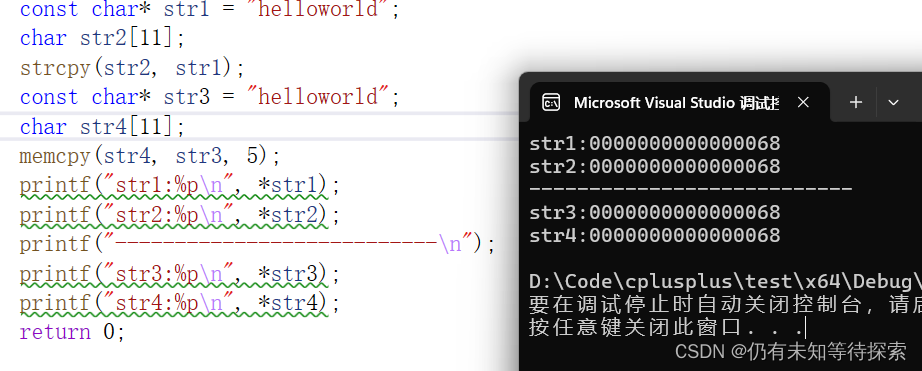
四、总代码
#include <iostream>
#include <cstring>
#include <assert.h>
using namespace std;namespace my
{class string{public:string():_str(nullptr),_size(0),_capacity(0){}string(const char* str):_size(strlen(str)),_capacity(_size){_str = new char[_capacity + 1];strcpy(_str, str);}string(const string& str):_str(new char[str._capacity + 1]),_size(str._size),_capacity(str._capacity){strcpy(_str, str._str);}~string(){delete[] _str;_str = nullptr;_size = 0;_capacity = 0;}typedef char* iterator;iterator begin(){return _str;}iterator end(){return _str + _size;}string& operator=(const string& str){char* tmp = new char[str._capacity + 1];strcpy(tmp, str._str);delete[] _str;_str = tmp;_size = str._size;_capacity = str._capacity;return *this;}void reserve(int x){if (_capacity < x){char* tmp = new char[x + 1];strcpy(tmp, _str);delete[] _str;_str = tmp;_capacity = x;}}void swap(string& str){std::swap(_str, str._str);std::swap(_size, str._size);std::swap(_capacity, str._capacity);}const char* c_str() const{return _str;}void clear(){_str[0] = '\0';_size = 0;_capacity = 0;}void insert(int index, const string& str){int len = str._size;assert(index >= 0 && index < _size);if (_size + len >= _capacity){reserve(_capacity + len);}for (int i = _size - 1; i >= index; i -- ){_str[i + len] = _str[i];}for (int j = 0, i = index; j < str._size; j ++ ,i ++ ){_str[i] = str._str[j];}_size += len;}void insert(int index, char ch){assert(index >= 0 && index < _size);if (_size + 1 >= _capacity){reserve(2 * _capacity);_capacity *= 2;}for (int i = _size - 1; i >= index; i -- ){_str[i + 1] = _str[i];}_str[index] = ch;_size ++ ;}void append(const string& str){int len = str._size;if (len + _size > _capacity){reserve(len + _size);_capacity = len * _size;}int end = _size;for (int i = 0; i < str._size; i ++ ,end ++ ){_str[end] = str._str[i];}_size += len;}string& operator+=(const string& str){append(str);return *this;}void push_back(const char ch){if (_size + 1 >= _capacity){reserve(2 * _capacity);}_capacity *= 2;_str[_size] = ch;_size ++ ;}int size() const{return _size;}int capacity() const{return _capacity;}bool empty() const{return _size == 0;}void resize(int n, char ch = '\0'){if (n < _size){for (int i = n; i < _size; i ++ ){_str[i] = '\0';}}else if (n + 1 < _capacity){for (int i = _size; i < n; i ++ ){_str[i] = ch;}}else{reserve(n);}}char& operator[](size_t index){assert(index < _size);return _str[index];}const char& operator[](size_t index)const{assert(index < _size);return _str[index];}bool operator==(const string& str){int ret = strcmp(_str, str.c_str());return ret == 0;}bool operator!=(const string& str){return !(*this == str);}bool operator>(const string& str){int ret = strcmp(_str, str.c_str());return ret > 0;}bool operator<(const string& str){int ret = strcmp(_str, str.c_str());return ret < 0;}bool operator<=(const string& str){return *this < str || *this == str;}bool operator>=(const string& str){return *this > str || *this == str;}int find (char c, size_t pos = 0) const{assert(pos < _size);for (int i = pos; i < _size; i ++ ){if (_str[i] == c) return i;}return npos;}int find (const char* s, size_t pos = 0) const{char* p = strstr(_str + pos, s);if (p != nullptr){return p - _str;}return npos;}string& erase (size_t pos = 0, size_t len = npos){assert(pos < _size);if (len == npos || len >= _size - pos){_str[pos] = '\0';_size = pos;}else{int i = 0;for (i = pos + len; i < _size; i ++ ){_str[i - len] = _str[i];}_str[i] = '\0';_size -= len;}return *this;}friend ostream& operator<<(ostream& out, const string& str);friend istream& operator>>(istream& in, string& str);private:char* _str; // string存的字符串size_t _size; // string中字符串的长度 size_t _capacity; // string的容量static const size_t npos = -1;};inline ostream& operator<<(ostream& out, const string& str){int len = str._size;for (int i = 0; i < len; i ++ ){out << str._str[i];}return out;}inline istream& operator>>(istream& in, string& str){str.clear();char ch = in.get();char buff[128];int i = 0;while (ch != ' ' && ch != '\n'){buff[i ++ ] = ch;if (i == 127){buff[i] = '\0';str += buff;i = 0;}ch = in.get();}if (i != 0){buff[i] = '\0';str += buff;}return in;}
}谢谢大家!
